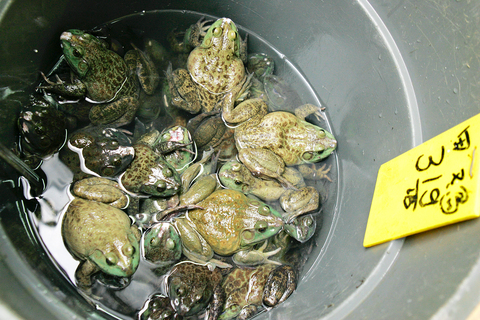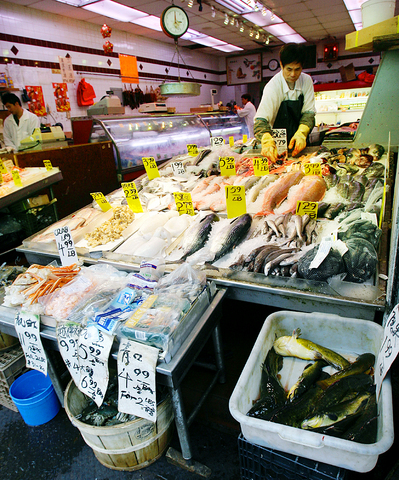When a food safety inspector walked into a market in the borough of Queens, he noticed the store had an interesting special posted on its front window: 12 beefy armadillos.
In Brooklyn, inspectors found 6.7kg of iguana meat at a West Indian market and 90kg of cow lungs for sale at another market.
At a West African grocery in Manhattan, the store was selling smoked rodent meat from a refrigerated display case.

PHOTO: AP
All was headed for the dinner table. All was illegal. Such food can spread nasty bacteria like salmonella or botulism.
Authorities say the discoveries are part of a larger trend in which markets across New York are buying meat and other foods from unregulated sources and selling them to an immigrant population accustomed to more exotic fare.
State regulators have increased enforcement measures, confiscating 65 percent more food through September than they did in all of last year.

PHOTO: AP
The seizures also focus on the eating habits of this ethnically diverse city, where everything from turtles and fish paste to frogs and duck feet make their way onto people's plates.
"At one time or another, we've probably seen about everything," said Joseph Corby, director of the state's Division of Food Safety and Inspection.
In an attempt to stop the activity, Corby's agency has increased efforts, working with the Food and Drug Administration, to prevent the illicit food from reaching store shelves.
Corby said his inspectors are also targeting warehouses that receive imported products -- Russian, Asian and African -- from where the food is distributed.
So far, it appears the campaign has been effective. In the first nine months of the year, inspectors across the state seized 720,000kg of food, destroying about 81 percent. Last year, the state seized 439,234kg.
Food taken by Corby's inspectors lacked proper labeling or did not come from a government licensed or inspected source.
Other food was destroyed because of the way it was processed or prepared, like chicken smoked in the home and placed on sale.
"Immigrants coming from the Third World would not be schooled in the issues of cross contamination and would not intuitively know hygiene standards," said Dr. Pascal James Imperato, a former city health commissioner who spent six years in Africa with the US Centers for Disease Control and Prevention.
"They don't know how simple contamination can result in a widespread epidemic," he added.
The law varies from animal to animal.
Bush meat, or anything killed in the wild, is typically illegal, Corby said. Eating endangered or threatened species like as gorilla and chimpanzee -- whose meat is occasionally found in New York -- is against the law.
But turtles, frogs, iguana and armadillos can be eaten under one condition: The meat must come from a licensed and inspected facility.
"We have yet to find too many of these places," Corby said.
State sanitary inspection reports dating back to 2001 reveal a widespread appetite for potentially dangerous food.
In Manhattan's Chinatown, Bor Kee Food Market has been caught selling unidentified red meat. Down the street at Dahing Seafood Market, inspectors have found frogs being sold from an unapproved source.
"That's a no-no because there is absolutely no monitoring of the standards in these places," said Dr. Philip Tierno, author of The Secret Life of Germs: Observations and Lessons from a Microbe Hunter, and director of clinical microbiology at New York University Medical Center.
"It's subject to the vagaries of whoever is processing the food. Who's watching?" he said.
In a city filled with people from all over the world, the law can get lost in translation.
At the West African Grocery -- where "smoked rodent" was found -- the owner failed to explain why he was selling the mysterious meat, saying he could not speak English.
At another market in Brooklyn called Chang Xiang Trading, the manager shrugged her shoulders when confronted with reports showing the store has sold illegal pork, chicken and ducks. Her English was not good, she said.
Sung Soo-kim, president of Korean American Small Business Service Center of New York, says it is hard to change centuries-old eating habits.
Kim runs a state-approved food safety education program and has delivered seminars to the Korean community about food laws.
Corby says that one way to get businesses to comply with the program is ordering them to take a state-approved food inspection course.
If all else fails, Corby will get a court injunction and close stores, something the state did 66 times last year and 72 times through September this year.
"We either clean them up or close them down," he said. "There is a high standard that is applied. We'd rather have it too high than too low."

MAKING WAVES: China’s maritime militia could become a nontraditional threat in war, clogging up shipping lanes to prevent US or Japanese intervention, a report said About 1,900 Chinese ships flying flags of convenience and fishing vessels that participated in China’s military exercises around Taiwan last month and in January last year have been listed for monitoring, Coast Guard Administration (CGA) Deputy Director-General Hsieh Ching-chin (謝慶欽) said yesterday. Following amendments to the Commercial Port Act (商港法) and the Law of Ships (船舶法) last month, the CGA can designate possible berthing areas or deny ports of call for vessels suspected of loitering around areas where undersea cables can be accessed, Oceans Affairs Council Minister Kuan Bi-ling (管碧玲) said. The list of suspected ships, originally 300, had risen to about

DAREDEVIL: Honnold said it had always been a dream of his to climb Taipei 101, while a Netflix producer said the skyscraper was ‘a real icon of this country’ US climber Alex Honnold yesterday took on Taiwan’s tallest building, becoming the first person to scale Taipei 101 without a rope, harness or safety net. Hundreds of spectators gathered at the base of the 101-story skyscraper to watch Honnold, 40, embark on his daredevil feat, which was also broadcast live on Netflix. Dressed in a red T-shirt and yellow custom-made climbing shoes, Honnold swiftly moved up the southeast face of the glass and steel building. At one point, he stepped onto a platform midway up to wave down at fans and onlookers who were taking photos. People watching from inside

Japan’s strategic alliance with the US would collapse if Tokyo were to turn away from a conflict in Taiwan, Japanese Prime Minister Sanae Takaichi said yesterday, but distanced herself from previous comments that suggested a possible military response in such an event. Takaichi expressed her latest views on a nationally broadcast TV program late on Monday, where an opposition party leader criticized her for igniting tensions with China with the earlier remarks. Ties between Japan and China have sunk to the worst level in years after Takaichi said in November that a hypothetical Chinese attack on Taiwan could bring about a Japanese

STREAMLINED: The dedicated funding would allow the US to transfer equipment to Taiwan when needed and order upgraded replacements for stockpiles, a source said The US House of Representatives on Thursday passed a defense appropriations bill totaling US$838.7 billion, of which US$1 billion is to be allocated to reinforcing security cooperation with Taiwan and US$150 million to replace defense articles provided to the nation. These are part of the Consolidated Appropriation Act, which the US House yesterday passed with 341 votes in favor and 88 against. The act must be passed by the US Senate before Friday next week to avoid another government shutdown. The US House Committee on Appropriations on Monday unveiled the act, saying that it allocates US$1 billion for the Taiwan Security Cooperation Initiative